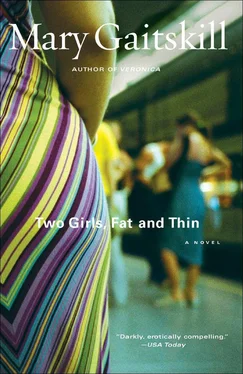Mary Gaitskill - Two Girls, Fat and Thin
Здесь есть возможность читать онлайн «Mary Gaitskill - Two Girls, Fat and Thin» весь текст электронной книги совершенно бесплатно (целиком полную версию без сокращений). В некоторых случаях можно слушать аудио, скачать через торрент в формате fb2 и присутствует краткое содержание. Год выпуска: 2012, Издательство: Simon & Schuster, Жанр: Современная проза, на английском языке. Описание произведения, (предисловие) а так же отзывы посетителей доступны на портале библиотеки ЛибКат.
- Название:Two Girls, Fat and Thin
- Автор:
- Издательство:Simon & Schuster
- Жанр:
- Год:2012
- ISBN:нет данных
- Рейтинг книги:5 / 5. Голосов: 1
-
Избранное:Добавить в избранное
- Отзывы:
-
Ваша оценка:
- 100
- 1
- 2
- 3
- 4
- 5
Two Girls, Fat and Thin: краткое содержание, описание и аннотация
Предлагаем к чтению аннотацию, описание, краткое содержание или предисловие (зависит от того, что написал сам автор книги «Two Girls, Fat and Thin»). Если вы не нашли необходимую информацию о книге — напишите в комментариях, мы постараемся отыскать её.
Review) create a haunting and unforgettable journey into the dark side of contemporary life and the deepest recesses of the soul.
Two Girls, Fat and Thin — читать онлайн бесплатно полную книгу (весь текст) целиком
Ниже представлен текст книги, разбитый по страницам. Система сохранения места последней прочитанной страницы, позволяет с удобством читать онлайн бесплатно книгу «Two Girls, Fat and Thin», без необходимости каждый раз заново искать на чём Вы остановились. Поставьте закладку, и сможете в любой момент перейти на страницу, на которой закончили чтение.
Интервал:
Закладка:
Many years later, when she told a man about this incident, he said he believed that child molestation was bad only because of the negative social rules that made the child feel sullied. Otherwise, he said, it would be good because it could only give the child pleasure, and children didn’t have reservations about pleasure until they were taught to. Another man told her it was good that she’d had the experience because “that man taught you something.” She didn’t argue with either of them because she didn’t know how to explain that this uncomprehended attack of invasive sensation had not felt like pleasure at all but rather like the long claws of some unknown aggression that had gripped her organs and her bones and never quite let go.
Dr. Norris and his son and she went to the park after that, she doesn’t remember how many times. Once she told her mother that “Dr. Norris touches me here,” and pointed to show her. Her mother was standing in the kitchen making dinner. She didn’t stop what she was doing. She said, “He just doesn’t know that little girls don’t like to be touched there.”
Chapter Six
My family moved to Ohio when I was seven. We lived in a large, cool, damp house outside Cincinnati. I couldn’t walk to school anymore and instead rode a bus with other children who sang, “The worms go in, the worms go out, the worms play pinochle on your snout.” There were lots of tornado warnings. Sometimes they would be followed by local news footage of some neighboring town that had been devastated. These broadcasts thrilled me; I loved to look at the destroyed houses and ripped up trees, the dazed, unkempt victims standing around in overcoats, mumbling for the spruce newscaster who asked them how they felt.
Once there was a tornado warning when I was at school, and the teachers led us all down the hall into the bomb shelter and kept us there an hour after school, talking about what to do in case of nuclear attack and singing about bottles of beer on the wall until the warning was over. We rode home in the twilight, exhilarated by our brush with death, loudly bawling the worm song. When I got home, my mother said, “I didn’t know they’d held you at school. I waited at the bus stop for half an hour. The wind whipped my legs until they were red and sore. I was terrified when you didn’t come.” She said this in the same girlish voice that she used to tell stories of Motherdear and Joedaddy, punctuating certain words with a tight, uplifted voice, as if she were describing a tasty dessert. Her voice wasn’t angry at all, which made me feel uneasy; it seemed as though she should be angry. I asked her why she hadn’t gone home. “Because I had to be sure you were safe. I stood there and stood there and my legs just burned.”
I hastily constructed a fantasy in which I came sailing through a full-blown tornado on the bus. (They’d tried to hold me at school, but I’d faced the principal with tears in my eyes and pleaded to be allowed to go home and be with my mother. He understood; gruffly he allowed me to go, and the bus driver, the old salt, was so overcome by the spirit of this brave, lone child that he volunteered to take me. “You’re mad!” cried my teacher, Miss Clutch. “Well maybe I am, and maybe I ain’t,” he said. “All’s I know is, I gotta kid, too, an’ if there was a tornado, I’d want ’er to be with ’er ma.”) In one version of this fantasy, he and I leapt from the bus together, he scooping my swooning mother into his arms and carrying her home, me clinging to his pant leg as we struggled through the ferocious wind. In my preferred version, I leapt out alone, and the driver tootled off into the tornado, waving a leathern hand and wiping a tear from his eye. Supporting my fainting mother on my shoulders, I struggled mightily through the storm, despite her gasps of “Leave me! Save yourself!” When we got home I bundled my mother in a blanket and bathed her short, plump legs in bubble bath.
I liked this fantasy so much I kept it nearby all day, and by nighttime, I no longer believed that my mother had suffered at the bus stop.
My mother always came to say good night to me when I was in bed. She would lean forward to kiss me as a prelude to leaving, and I would grab her robe and say, “Wait, I have to tell you about the squirrels versus the cats in school today,” or, “Tell me about when you and Daddy skipped school.” She stayed and stayed, and it never did any good. No matter how many stories she told or listened to, no matter how many times she stroked my back with her fingertips, I felt the same emptiness and panic when she left. I didn’t even enjoy her stroking; I devoured it with feverish passivity, my mind lunging forward ahead of her fingers to consume her touch before it came. She’d leave and I’d be left with my hideous, rearing thoughts. I would fixate on the strip of light coming from my partly open door, listening to the TV and radio voices, trying to figure out where my parents were and what they were doing from the sound of their footsteps, chair-creakings, and voices. Then they went to bed and the light was gone. Some nights I lay in such anxiety that I could sleep only when morning came. Throughout the day, the residue of the night’s tension stayed in my body.
My father didn’t like Ohio. It was only two states away, but to him it was the last decisive step away from civilization into gum-popping, transistor-blasting subhumanity. He saw evidence of this everywhere. He’d go to the drugstore, and sullen teenagers, smirking and scratching themselves behind the counter, would rather tell each other jokes than wait on him. When he said “Thank you,” they didn’t answer him. The clerks at the grocery store didn’t answer him either, and once one of them rang up his bill wrong and then was rude about it. None of this, he said, ever happened in Tennessee. “And that’s the last of Alfred A. Footie’s business those sons of bitches will ever get.”
At night he’d put on a marching record and walk up and down talking the same way he had at the house in Tennessee, only now it was more desperate in tone, as though everywhere the bastards were gaining ground. The music battered the walls, and my mother moved in the kitchen as if his voice were the force behind her movements. During dinner my father would talk about moving back to Tennessee and tell stories about ordinary people foiling criminals: Gas station attendants had sprayed a thief with gas and threatened him with books of matches until the police arrived. A husband beat his wife’s escaping rapist half to death. An entire family ran out of their house and pounded a youth who was wrestling an old lady for her purse. “A society,” he warned, “has to protect itself. Just like old Jim McCann and that big bastard in the south of France. The big sonofabitch stood outside his tent for half an hour calling him filthy names because Jim was a nice little guy and he didn’t think he could do anything about it. But he did. He came out of that tent in the goddamned rain and beat that bastard’s ass. And that’s just what I’m going to do to anybody who thinks I’m not big enough to fight back. Knock their teeth down their goddamn throat.”
In awe, I locked the gray, twilight scene in my memory. The morose sheet of rain, the small decent man roused from his sleep by the ominous shadow outside. The outpouring of vileness, the weary flap of the tent, the squaring off in the dark, the fight to the finish in the mud. My father had been there. He hadn’t taken part but he’d observed righteousness taking place, he’d recorded it, he’d approved of it. It was like Combat! on TV.
We watched Combat! every Tuesday. I loved the theme from Combat! and can remember the final bars even today. The theme was about fighting and winning but it was also about something more subtle and intimate, something voluptuous. I didn’t know exactly what this something was, but it had a lot to do with Lt. Hanley. Lt. Hanley was a slim, boyish person with large, flowerlike eyes. He was always getting captured or wounded. Even when he wasn’t getting captured, there was something about him that made his capture seem imminent. Episode after episode featured Lt. Hanley bound on the floor or to a chair while a large German stood over him, arrogantly resting his jackbooted foot on a table or something. (“Why does he put his foot there?” I asked. “Because Germans love their boots,” said my mother. “They love to show them off.”) Of course, Sgt. Saunders, a grizzled, stocky man, would come rescue him, and they would go on with the plot, but there was always a small moment when it was so nice to have Lt. Hanley tied up and looking at his captor with those brave, flowerlike eyes, and somehow the music referred to that moment. It was a very human theme song, I guess.
Читать дальшеИнтервал:
Закладка:
Похожие книги на «Two Girls, Fat and Thin»
Представляем Вашему вниманию похожие книги на «Two Girls, Fat and Thin» списком для выбора. Мы отобрали схожую по названию и смыслу литературу в надежде предоставить читателям больше вариантов отыскать новые, интересные, ещё непрочитанные произведения.
Обсуждение, отзывы о книге «Two Girls, Fat and Thin» и просто собственные мнения читателей. Оставьте ваши комментарии, напишите, что Вы думаете о произведении, его смысле или главных героях. Укажите что конкретно понравилось, а что нет, и почему Вы так считаете.












